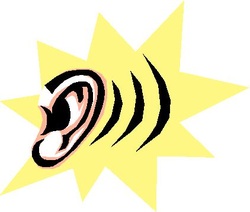
Tinnitus and negative thinking
Tinnitus is a noise (often ringing, swishing, buzzing or whistling) that is heard in the ears or head. While the perception of the noise is real, there is no actual external physical noise present. It is very easy to fall into the trap of negative thinking when you are coping with a chronic stressor like tinnitus. As tinnitus is often made worse by stress, watch your thoughts and check you are not adding to the distress with negative thoughts about it. The more stressed you are by tinnitus, the more aware you will be of it, leading to more irritation and distress.
Psychological Treatment for Tinnitus
There are psychological strategies to assist with getting out of these negative cycles. Cognitive Behaviour Therapy (CBT) has been found to reduce the distress from tinnitus. For a really helpful website for sufferers of tinnitus, which includes lots of resources including a very informative webinar on psychological treatment for tinnitus using CBT, click this link.
Another website with a range of free mediations to assist with tinnitus can be accessed here.
Acceptance and Commitment therapy (ACT) has also been used as treatment for tinnitus. ACT has particular strategies aimed at helping you accept a condition that cannot be cured. This is because the very essence of ACT is learning ways of managing troubling thoughts, feelings and chronic conditions so they do not stop you from leading a rewarding and meaningful life.
Clean and dirty distress
ACT makes a distinction between “clean distress” and “dirty distress” when dealing with chronic conditions. The principle of clean distress is that you are just experiencing the pure distress (I’m sad, this is unpleasant) without muddying the waters by adding in further negative thoughts like judgements (I should be able to cope better), assumptions (this is my fault) or predictions (I’ll never be able to cope with this). It also refers to additional feelings about your feelings (e.g. sad about being sad, angry about feeling anxious). So feeling irritated about your sadness over how silence is no longer a peaceful experience for you is “dirty” distress. Judging yourself for being sad would also be “dirty” distress. The sadness itself is “clean” distress.
Stop struggling
Coping with tinnitus also means coming to terms with the fact that it is a chronic condition. This means you need to give up struggling with trying to get rid of it. Instead, the key is to work out how to live around it. While you can shift your attention from it and focus on other things (sounds, people, and activities) in your present environment, it may always be there in the background.
Trying to get rid of something that you cannot control is also “dirty” distress. ACT teaches you ways of acknowledging and accepting “clean” distress and ways of managing and letting go of the “dirty” distress that could pull you into a downward spiral of further distress.
Enjoy life around it
Fortunately, you live in a world where this challenging problem can now be managed much more effectively than a few years ago. The essence of managing tinnitus it to learn not to fight it, but to enjoy life around it. Making this cognitive shift to true acceptance can free you up more than you might imagine. By applying these strategies, getting appropriate treatment for tinnitus and becoming an expert at identifying your tinnitus free moments, tinnitus can be relegated to just one of life’s myriad, minor problems.
Tinnitus is a noise (often ringing, swishing, buzzing or whistling) that is heard in the ears or head. While the perception of the noise is real, there is no actual external physical noise present. It is very easy to fall into the trap of negative thinking when you are coping with a chronic stressor like tinnitus. As tinnitus is often made worse by stress, watch your thoughts and check you are not adding to the distress with negative thoughts about it. The more stressed you are by tinnitus, the more aware you will be of it, leading to more irritation and distress.
Psychological Treatment for Tinnitus
There are psychological strategies to assist with getting out of these negative cycles. Cognitive Behaviour Therapy (CBT) has been found to reduce the distress from tinnitus. For a really helpful website for sufferers of tinnitus, which includes lots of resources including a very informative webinar on psychological treatment for tinnitus using CBT, click this link.
Another website with a range of free mediations to assist with tinnitus can be accessed here.
Acceptance and Commitment therapy (ACT) has also been used as treatment for tinnitus. ACT has particular strategies aimed at helping you accept a condition that cannot be cured. This is because the very essence of ACT is learning ways of managing troubling thoughts, feelings and chronic conditions so they do not stop you from leading a rewarding and meaningful life.
Clean and dirty distress
ACT makes a distinction between “clean distress” and “dirty distress” when dealing with chronic conditions. The principle of clean distress is that you are just experiencing the pure distress (I’m sad, this is unpleasant) without muddying the waters by adding in further negative thoughts like judgements (I should be able to cope better), assumptions (this is my fault) or predictions (I’ll never be able to cope with this). It also refers to additional feelings about your feelings (e.g. sad about being sad, angry about feeling anxious). So feeling irritated about your sadness over how silence is no longer a peaceful experience for you is “dirty” distress. Judging yourself for being sad would also be “dirty” distress. The sadness itself is “clean” distress.
Stop struggling
Coping with tinnitus also means coming to terms with the fact that it is a chronic condition. This means you need to give up struggling with trying to get rid of it. Instead, the key is to work out how to live around it. While you can shift your attention from it and focus on other things (sounds, people, and activities) in your present environment, it may always be there in the background.
Trying to get rid of something that you cannot control is also “dirty” distress. ACT teaches you ways of acknowledging and accepting “clean” distress and ways of managing and letting go of the “dirty” distress that could pull you into a downward spiral of further distress.
Enjoy life around it
Fortunately, you live in a world where this challenging problem can now be managed much more effectively than a few years ago. The essence of managing tinnitus it to learn not to fight it, but to enjoy life around it. Making this cognitive shift to true acceptance can free you up more than you might imagine. By applying these strategies, getting appropriate treatment for tinnitus and becoming an expert at identifying your tinnitus free moments, tinnitus can be relegated to just one of life’s myriad, minor problems.

 RSS Feed
RSS Feed